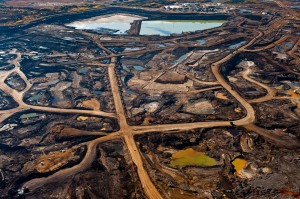 In a piece about a new essay by MSNBC host and Nation editor-at-large Chris Hayes, an interesting view on the climate crisis and a new notion (to me) about what might be required:
In a piece about a new essay by MSNBC host and Nation editor-at-large Chris Hayes, an interesting view on the climate crisis and a new notion (to me) about what might be required:
Drawing off of an earlier essay written by climate activist and expert Bill McKibben — as well as the work of the Carbon Tracker Initiative — Hayes notes that the total amount of carbon in the proven fossil fuel reserves of the world’s energy corporations and fossil fuel-producing countries (2,795 gigatons) vastly exceeds the amount scientists say we can release into our atmosphere by the middle of this century before risking catastrophic climate change (565 gigatons). And what makes this disparity even more alarming is the fact that these carbon reserves are worth an estimated $20 trillion. If we’re going to save the planet, in other words, then a lot of powerful interests in the energy sector will have to leave a lot of money on the table.
Taking into consideration the enormous amount of wealth that will have to be nullified if climate activists are to achieve their goal, Hayes draws an intriguing parallel between the modern divestment movement and the abolitionist movement of the 19th century. While he makes pains to emphasize that he doesn’t see people in the energy industry as morally equivalent to slaveholders, Hayes argues that the only precedent in American history of a political group relinquishing so much wealth is the emancipation of the South’s slaves in the 1860s — an achievement that was reached in part through a hideous Civil War.
So… are we going to have to compensate energy companies not to take more carbon out of the ground? While not as crazy as you might think (it’s in some way crazier), this gambit has some historical analogs in the immediate pre-Civil war that were also seen as desperate, last gasp efforts. And abandoned. What the suggestions say about us and craven lack of ability to deal with our own planetary suicidal tendencies, they say rather loudly. This type of self-extortion should be reserved for dystopian sci-fi adventures. And the [horrible] thing is, I’m not at all certain that we shouldn’t do it!
Paying companies for not making money from poisoning us all. Do not attempt to think about this for extended periods, or depression may occur.
Image: Alberta Tar Sands, via Occupy.com
